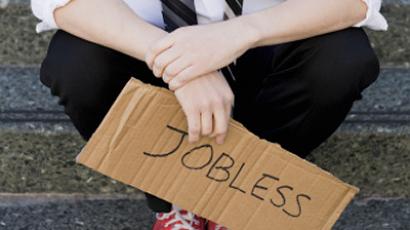Tearing down the American dream

When it comes to the American Dream, visions of white picket fences are front and center. But for decades, those fences have been propped up by the government, largely through Fannie Mae and Freddie Mac.
Since taking these enterprises over in the wake of the housing crisis, the federal government is now backing 90 percent of new mortgages. But with new proposals the message of the Obama Administration seems clear, the US can no longer afford to prop up the middle class.The American Dream. What does it mean?“To have a good job and buy a home and provide for your family,” is how Sontra, an American we met outside of her suburban home, described it. “I always talk about the white picket fence.”It’s that traditional vision of home ownership central to living the dream, which has turned into a nightmare for millions of Americans who have lost their homes to foreclosure or are facing it now. People like retired corrections officer Sontra, who didn’t want to reveal her identity on camera, largely because of this.“It’s a horrible feeling to be facing foreclosure, you try to take care of your family and your children the best you can,” she described.But Sonta feels helpless in the fight against losing their home, a situation she's in because of a dispute with the banks over the terms of her adjustable rate mortgage.“I do feel like it should be my right to remain in my home,” she defended. “I’ve been here almost 20 years.”But now, Americans like Sontra may have to kiss the national ethos that says owning a home is a birthright goodbye, altogether.“In the future people may still aspire to and get the picket fence but they’re gonna have a hard time getting the house they expect to go with it and they may end up with just the fence,” is how economist Max Fraad Wolff, a professor at The New School, summed it up.That’s because for decades, it’s been two government-sponsored firms propping up home ownership in the country, by keeping money flowing to mortgage lenders:Fannie Mae and Freddie Mac. You may recall them from the financial crisis, when their losses led the US government to bail them out to the tune of $150 billion.In the working class neighborhood of Jamaica, outside of New York City in Queens, you can get a sense of what some of these losses from the housing crisis look like.This two-family-home for example sold for $650,000 before the crisis.After going into foreclosure, $175,000 of that debt was sold at auction for just $2,000 dollars.And with the government in control of Fannie and Freddie, American taxpayers stand behind $6 trillion dollars in mortgage debt. Now the government says it has to get out.“We need to wind down Fannie and Freddie and substantially reduce the government’s footprint in the housing market,” US Treasury Secretary Timothy Geithner said, in regards to the proposals the Obama Administration is rolling out.It's a departure from past government policies which have treated homeownership as a virtual right. In a report to Congress the Obama Administration stated “that all Americans have access to quality housing that they can afford. Not “for all Americans to be homeowners.”Analysts say ultimately with old policies and Fannie and Freddie going by the wayside, so too will the white picket fence dream they helped manufacture.“Interest rates will go up because there will be more risk, and home ownership will go down,” Joe Weisenthal, deputy editor of The Business Insider said of the scenario if the government stops backing home mortgages all together.And it’s not just the US middle class that’s going to feel it. Foreign countries all over the world hold billions upon billions of US home mortgages in their portfolios.Doing away with Fannie and Freddie could amount to massive losses for these investors, and for US clout. Especially when you consider economists said shoring up foreign investment was a major reason for Fannie and Freddie’s bailout in the first place.But America appears unable to afford another option in the face of such massive failure.“I believe the banks were making bad loans,” Sontra said from her experience. “I think it was just greed.”“Fannie and Freddie got out of control took ridiculous amounts of risks which didn’t properly disclose to regulators or investors who were slammed by misadventure,” explained Wolff.A misadventure coming at the cost of the American Dream that so many Americans and that the world, bought into.Author and journalist David DeGraw said both Freddie Mac and Fannie Mae brought the system down through flawed policies, but they did not do it alone.“Let’s talk about unwinding the people who caused this problem; Bank of America, Goldman Sachs, JP Moran, how come were not talking about winding them down?” asked DeGraw. “These are fraudulent institutions that exploded the housing market.” He argued Wall Street is a “mafia racket” of legalized political bribery controlling the US legislature. “The criminals have taken over. They are obviously above the law,” DeGraw comments. “These are the people that have to have their assets frozen and we can recoup the money that way. One tenth of the US population has robbed everyone blind.” Americans simply are unaware of the magnitude how much money and wealth has been stolen by such a small version of the population, if the people knew, Egypt style revolt would sweep across the US, he argued.














